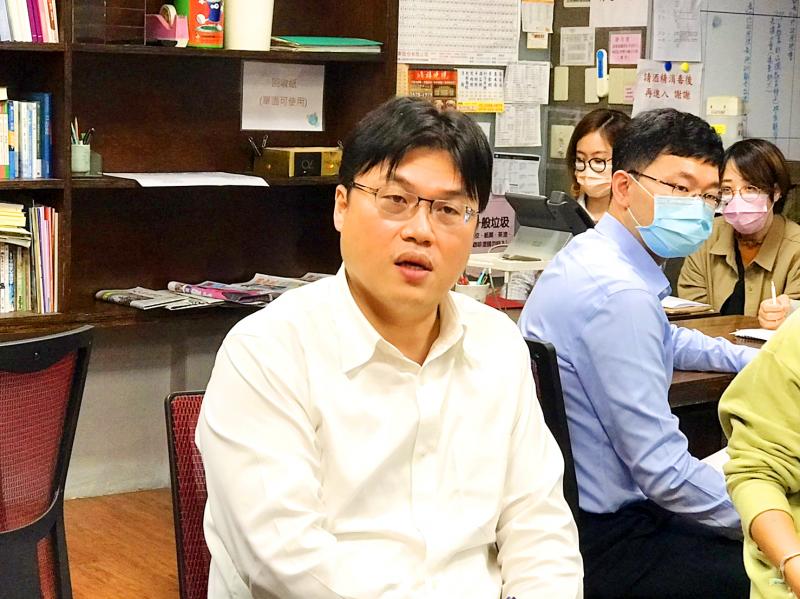A company providing access to an online database of academic theses and dissertations has been accused of cooperating with Chinese political censorship and content revisions.
Media reports said that master’s theses and doctoral dissertations by students at local universities, including National Taiwan University (NTU), had all instances of “my country” changed to “Taiwan.”
Not a single word should be changed in papers authorized by students and professors, NTU president Kuan Chung-ming (管中閔) said yesterday on the sidelines of an NTU event.

Photo: Wu Po-hsuan, Taipei Times
No one is allowed to revise papers that have been authorized, he said, adding that it was a fundamental rule in academia.
For example, it would be unreasonable if automated translation software changed every mention of “New Taiwan dollar” in a paper to “New Chinese Taipei dollar,” he said.
The university would ask businesses not to make changes, he said.
The Ministry of Education said that the nation’s sovereignty should not be belittled.
The ministry would instruct universities and colleges to evaluate their database vendors, it said.
If improper actions are found, universities should immediately demand that the vendors make improvements, it said, adding that the universities should terminate their contracts if no improvements are made.
Airiti (華藝) — the vendor in question — said in a statement on Wednesday that when it exports Taiwanese academic content, the content is in its original form.
The Chinese market has certain particularities, so the metadata can be tweaked to increase the possibility of the content being discovered in an online search, but the body of a work would not be touched, Airiti said.
NTU sociology professor Ho Ming-sho (何明修) wrote on Facebook on Wednesday that a keyword search of his full name resulted in 23 hits on Airitilibrary.cn and 57 results on Airitilibrary.com, despite the databases belonging to the same company.
Not all of the 57 search results on the second platform were his articles, but articles of his that were missing could be considered “sensitive,” including a 2017 article titled “The Third Force and Umbrella Soldiers: Comparing the Elections of Taiwan after the Sunflower Movement and Hong Kong after the Umbrella Movement,” Ho said.
An Airiti representative said that it is inevitable that different countries and regions have different regulations.
The company can only respect that a database subscriber chooses the content they need, the representative said.

‘TAIWAN-FRIENDLY’: The last time the Web site fact sheet removed the lines on the US not supporting Taiwanese independence was during the Biden administration in 2022 The US Department of State has removed a statement on its Web site that it does not support Taiwanese independence, among changes that the Taiwanese government praised yesterday as supporting Taiwan. The Taiwan-US relations fact sheet, produced by the department’s Bureau of East Asian and Pacific Affairs, previously stated that the US opposes “any unilateral changes to the status quo from either side; we do not support Taiwan independence; and we expect cross-strait differences to be resolved by peaceful means.” In the updated version published on Thursday, the line stating that the US does not support Taiwanese independence had been removed. The updated

‘CORRECT IDENTIFICATION’: Beginning in May, Taiwanese married to Japanese can register their home country as Taiwan in their spouse’s family record, ‘Nikkei Asia’ said The government yesterday thanked Japan for revising rules that would allow Taiwanese nationals married to Japanese citizens to list their home country as “Taiwan” in the official family record database. At present, Taiwanese have to select “China.” Minister of Foreign Affairs Lin Chia-lung (林佳龍) said the new rule, set to be implemented in May, would now “correctly” identify Taiwanese in Japan and help protect their rights, the Ministry of Foreign Affairs said in a statement. The statement was released after Nikkei Asia reported the new policy earlier yesterday. The name and nationality of a non-Japanese person marrying a Japanese national is added to the

AT RISK: The council reiterated that people should seriously consider the necessity of visiting China, after Beijing passed 22 guidelines to punish ‘die-hard’ separatists The Mainland Affairs Council (MAC) has since Jan. 1 last year received 65 petitions regarding Taiwanese who were interrogated or detained in China, MAC Minister Chiu Chui-cheng (邱垂正) said yesterday. Fifty-two either went missing or had their personal freedoms restricted, with some put in criminal detention, while 13 were interrogated and temporarily detained, he said in a radio interview. On June 21 last year, China announced 22 guidelines to punish “die-hard Taiwanese independence separatists,” allowing Chinese courts to try people in absentia. The guidelines are uncivilized and inhumane, allowing Beijing to seize assets and issue the death penalty, with no regard for potential

‘UNITED FRONT’ FRONTS: Barring contact with Huaqiao and Jinan universities is needed to stop China targeting Taiwanese students, the education minister said Taiwan has blacklisted two Chinese universities from conducting academic exchange programs in the nation after reports that the institutes are arms of Beijing’s United Front Work Department, Minister of Education Cheng Ying-yao (鄭英耀) said in an exclusive interview with the Chinese-language Liberty Times (the Taipei Times’ sister paper) published yesterday. China’s Huaqiao University in Xiamen and Quanzhou, as well as Jinan University in Guangzhou, which have 600 and 1,500 Taiwanese on their rolls respectively, are under direct control of the Chinese government’s political warfare branch, Cheng said, citing reports by national security officials. A comprehensive ban on Taiwanese institutions collaborating or